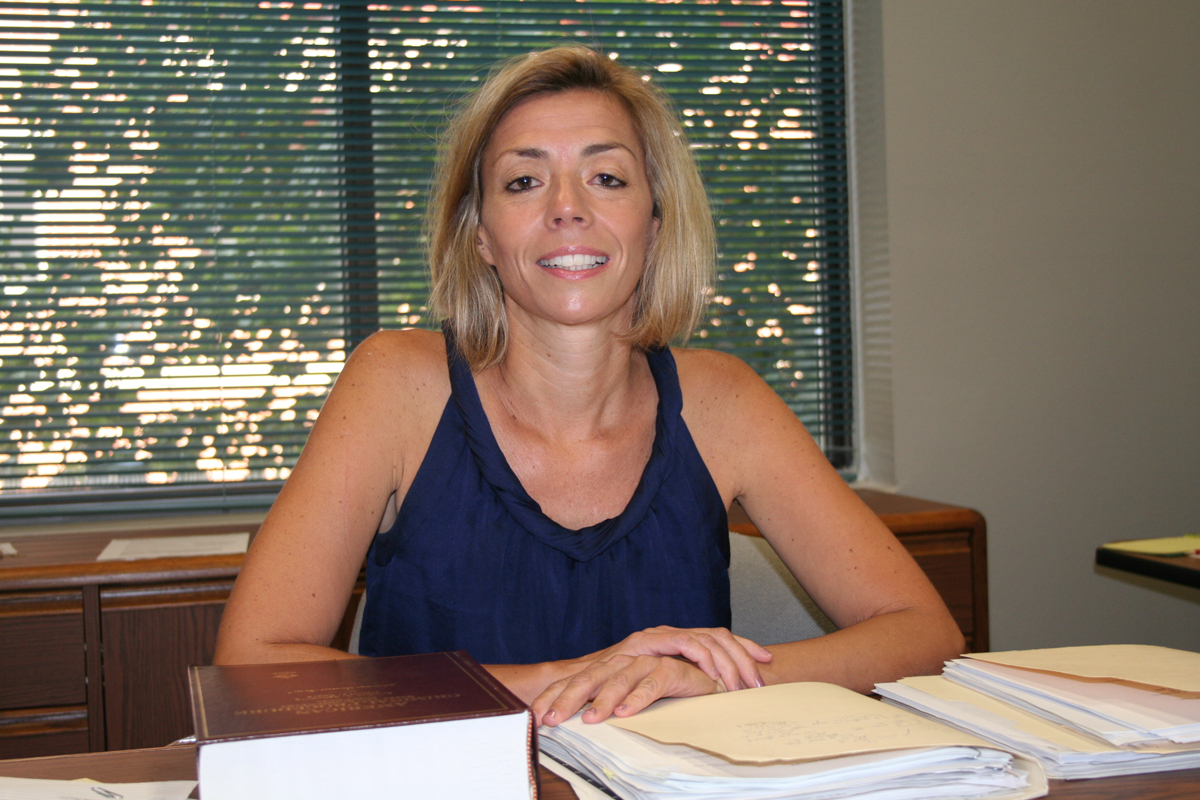
Oct. 18, 2023 – As a law student, there wasn’t any circumstance that Kelli Thompson could envision that would inspire her to work in a courtroom.
As the daughter of a lawyer – and former Wisconsin governor – Tommy Thompson, she had taken his advice and headed to law school. Her aim at the time was not necessarily to be a lawyer. “I wanted the J.D. because I thought it would open doors – which a law degree does,” she said.
She attended law school at Marquette University, and in her third year, her father advised her to “at least step into the courtroom,” specifically with the public defender clinic. She signed up, but told him she had no plans to practice in any field involving a courtroom. “This is not me … I’m going to hate it all.”
She was wrong.
On her first day she was immediately “thrust upon” a group of staff attorneys who “took me under their wing. And after the first day, I walked in and I said ‘I don’t think I ever want to do anything else.’”
What changed her mind? It was “the feel of the office,” mission-driven and everyone there “coming together,” to what was happening in court, to the public defenders “talking to their clients as human beings” and with compassion. “That office buzzed all night, every night, all weekend, with people talking about their cases.” The office has an energy of people “that we’re all in it together” feeling.
“I felt like I found my home,” Thompson said.
Where it Started
Thompson received her undergraduate degree in political science from the U.W.-Madison in 1993, and her law degree from Marquette University in 1996.
After starting with the Wisconsin State Public Defender’s Office as a trial attorney in Milwaukee in 1996, she took a one-year position in government relations in Milwaukee, as a commissioner on the state Personnel Commission. She joined the Madison Public Defender’s Office in March 2003 as agency legal counsel and became deputy State Public Defender in January 2004. She was appointed Wisconsin State Public Defender (SPD) on April Fools’ Day 2011. “Seemed very appropriate,” Thompson said with a laugh.
While SPD, among other work, she served in 2012-13 as chair of the State Bar of Wisconsin Board of Governors.
She stepped down Oct. 9, 2023, after 12 years at SPD, with Katie York taking over as Acting Wisconsin State Public Defender.
The Most Critical Part of the Justice System
You won’t make a lot of money working as a public defender, “but you get to really work with individuals, tell their story, and try to figure out what’s best for their case,” Thompson said. “That is a privilege. I am passionate about this work because it is mission-driven.”
 Shannon Green is communications writer for the State Bar of Wisconsin, Madison. She can be reached by email or by phone at (608) 250-6135.
Shannon Green is communications writer for the State Bar of Wisconsin, Madison. She can be reached by email or by phone at (608) 250-6135.
The Public Defender’s Office is, Thompson says, “in my humble opinion, the most critical part of the justice system, because we represent the individual against the government. We help protect individual rights and liberty, the Constitution, and due process rights.”
She is proud of public defenders’ individual client representation. Public defenders, she says, define success not necessarily as obtaining an acquittal, dismissal, or a win. “It’s making certain you have provided the opportunity for your client’s story to be told, and that you really advocate for them and do something that moves them forward as a human being,” Thompson said.
Because their clients are, after all, human beings. “These are individuals, our neighbors, our children, our parents and grandparents. These are people we see in the grocery store and out on the streets,” she said. “They are our people,” many who are simply struggling to survive from one day to another, let alone live their lives. “Any one of us can be caught in a situation from making a bad decision.”
“I hope I have had some impact on talking about our clients as people with real stories, real lives, real trauma, real challenges, real obstacles – but also real hope for their own futures,” she said.
She’s also proud of the Public Defender’s Office’s successes on policy and their work with the legislature. “That we are at the table and telling how it affects our agency,” she said. “We have a voice – we’ve worked really hard at that.”
Criminal Justice Funding
The recently passed biennial state budget saw success for the criminal justice system, including public defenders. “I can’t take credit for it,” Thompson said.
She noted that a coalition of public defenders, prosecutors, the state Department of Justice, and other groups “worked as a group to move the justice system’s agenda forward.”
With support from outside groups like the Badger Institute in Milwaukee, the Wisconsin Counties Association, and the State Bar of Wisconsin, the Wisconsin Legislature and Gov. Tony Evers stood behind new investments in the criminal justice system, which was cracking at the seams.
Legislators, she says, realized that giving to one part only leaves the system unbalanced and won’t work as it should. Supporting the justice system isn’t partisan or even political, she said. “This is a justice issue. That's everyone working together to say these issues impact Wisconsin as a whole – individuals, families, our communities.”
“I will always consider that a huge success – not for me, but for this agency,” Thompson said.
‘I Quit Maybe Once Per Week’
The two aspects of being a public defender – standing by and advocating for individuals, and the greater policy work with the legislature and governor is what is remarkable about the job, Thompson said.
She is lucky, she said, because she has had “phenomenal” support of family, friends, and colleagues throughout the years. Her parents, she said, are her role models, who taught that “you’re never better than anyone else, and you’d better be ready to help the person next to you. Don’t just talk it – walk it.”
And that is what the Public Defender’s Office is about: “You get to be phenomenal litigators with amazing support staff – you have these very smart people coming together to protect individual liberties, the Constitution, due process. What bigger privilege is there really, to be able say this is what I get to do?”
“But it’s exhausting. I hit my head against the wall every single day. I quit maybe once per week. We’re asking the criminal justice system to do way too much that it’s not equipped to do,” Thompson said.
That makes it vitally important to continue to look for alternatives – with Wisconsin’s strong economy, “we have individuals sitting in cages. We have to find opportunities to get them back into their communities. They want to work, and we need to support them in that,” she said.
The difficulty is that each client’s path is an individual one. “We need to be there next to them to support and help them, then pick them back up,” whether one time or fifty times, when they need it. “There is no magic number,” she said. “We recognize that.”
That’s why policy is important, she said. From legislative policies to those of the Department of Justice and Department of Corrections or at the county level – coming together to make a real impact on the individuals in crucial. “It’s about getting people into the programming they need early, so they can be released, or getting them into a drug treatment, OWI, mental health, or other treatment court.”
Not all issues can be solved with a conviction. “We want to make people behave better, so we criminalize something – yet that is keeping people from being able to obtain employment, from doing more with their lives.” Looking at these issues may involve, for example, seeing certain drug cases as really a health care issue. “We have to continue to find opportunities to give people a chance to become positive members of society, to be employable and take care of their children. I don’t think we really want to take those opportunities away from people,” she said. “We need to look long-term.”
The SPD’s Biggest Issue
The largest obstacle for the Public Defender’s Office is one that isn’t easily solvable: “Workload,” she said.
The agency’s hybrid nature means that both public defenders and private attorneys take up cases. “I want the private bar attorneys to know how extraordinarily important they are to this work,” Thompson said. “We have our staff attorneys, and then for our overflow and conflict cases, our private attorneys – and these people are fantastic.”
Yet, the amount of discovery information per case has increased exponentially, requiring more time spent on an increasing number of cases. “You have all these cases, hundreds of clients, and then all this workload, and there just aren’t enough hours in the day,” she said.
The issue is a national one, not just in Wisconsin. While Wisconsin isn’t the highest or worst in the country for public defender workload, “we’re still under water,” Thompson said.
The effect of COVID-19 has changed the way the courts conduct business. “Certainly, we have become more flexible, and thinking outside the box with technology,” such as using video for some hearings, she said, saving travel time and expense.
But they are still overloaded with cases.
A solution comes down, again, to support from the legislature and governor. Thompson is grateful for the recent support from both. “I think people recognize the importance of it.”
But more is needed. “We lose people every day because they say ‘I just can’t do it at this level,’” Thompson said. “There is so much to do that there isn’t work-life balance, for people to go home and see their children.”
“There’s just so much to do, and our clients need so much, that it’s very difficult to look at a client and tell them you can’t do more for them. It’s just really, really hard work, and with very limited resources.”
A solution: more office staff, in addition to additional public defenders.
“Today, we are overburdened and overworked – we have to continue to find ways to support the system,” Thompson said.
In a July 11, 2022, Rotunda Report, Thompson talked more about issues facing the Office of the Public Defender.
Leaving Is the Right Decision
Leaving her position as SPD is “sad – there’s no doubt about it,” Thompson said. “This is the work I am passionate about, that I love.” But it “is the right decision for the agency. We need to give others opportunities.”
The SPD has a “phenomenal” successor, according to Thompson, in Katie York. “I walk out the door with no worries. The team here is fantastic,” Thompson said.
And what’s next? She’s continuing with her cases as a private attorney. “I’m not leaving my clients,” she said. After taking some time to breathe, she’ll figure out what’s next. “I will have time afterward to figure out my next career. … Maybe bartending,” she added with a smile.
